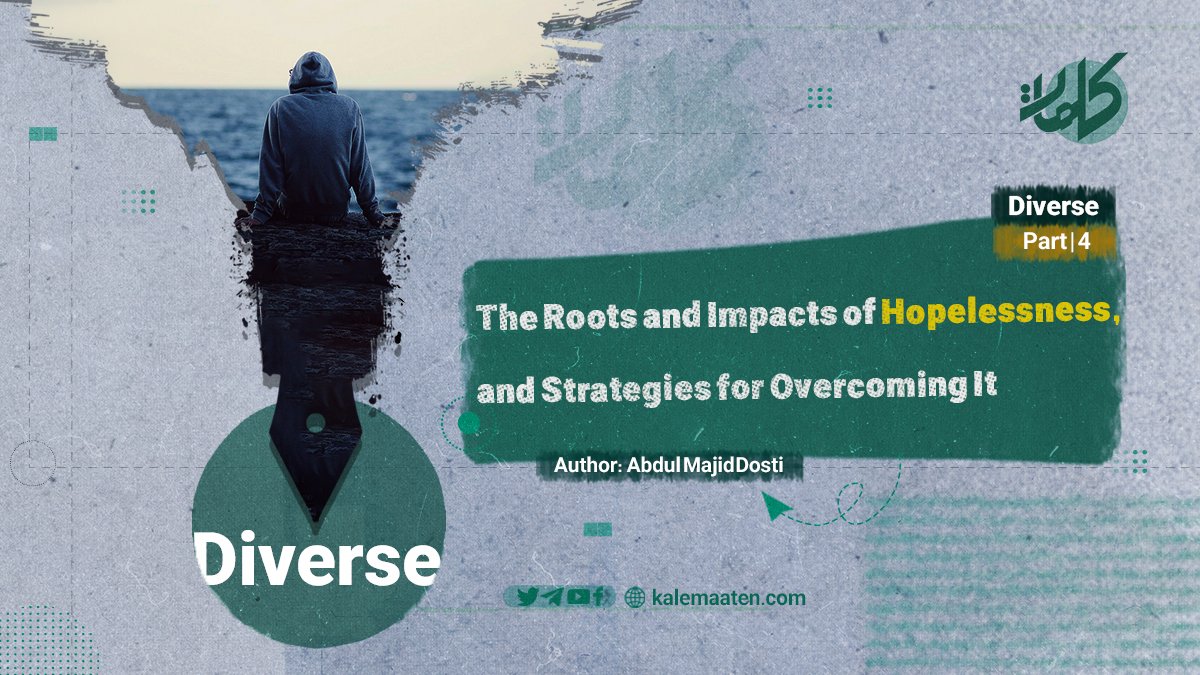
Author: Abdul Majid Dosti
The Roots and Impacts of Hopelessness and Strategies for Overcoming It (Part Four)
Among the many factors that can cause Hopelessness in a person’s thoughts and drag him into the valley of misery and stagnation is the act of committing sins and transgressions, distancing oneself from the presence of Allah, and becoming polluted with the stench of spiritual and psychological filth. In this section, we will examine this factor more closely.
3. Committing Sins and Insisting on Them
Allah created mankind and knew the paths they should follow and those they should avoid. Humans should understand which paths align with their nature and character and which one’s conflict with their inner selves and spirits. Allah has determined the main goal and key destination of human life, as He has stated in the Holy Quran:
«وَ مَا خَلَقْتُ الْجِنَّ وَ الْإِنْسَ إِلَّا لِيَعْبُدُونِ؛ من جن و انس را نیافریدم جز برای اینکه مرا عبادت کنند.»
Worshipping Allah and adhering to religious orders and teachings is the primary purpose of humanity. Additionally, avoiding sins and steering clear of dangers are considered crucial aspects of human life. Allah says in this regard:
«قُلْ يَا عِبَادِيَ الَّذِينَ أَسْرَفُوا عَلَىٰ أَنْفُسِهِمْ لَا تَقْنَطُوا مِن رَّحْمَةِ اللَّهِ إِنَّ اللَّهَ يَغْفِرُ الذُّنُوبَ جَمِيعًا إِنَّهُ هُوَ الْغَفُورُ الرَّحِيمُ؛
Say: O My servants who have transgressed against yourselves, do not Hopelessness of the mercy of Allah. Allah forgives all sins. He is Oft-Forgiving, Most Merciful.” (Surah Az-Zumar, verse 53)
Repentance and returning to the right path are the keys to permanence and hope in life. Humans must avoid sins and turn back from the wrong paths they have taken. Allah states:
«وَ الَّذِينَ إِذَا فَعَلُوا فَاحِشَةً أَوْ ظَلَمُوا أَنْفُسَهُمْ ذَكَرُوا اللَّهَ فَاسْتَغْفَرُوا لِذُنُوبِهِمْ وَ مَنْ يَغْفِرُ الذُّنُوبَ إِلَّا اللَّهُ وَ لَمْ يُصِرُّوا عَلَىٰ مَا فَعَلُوا وَ هُمْ يَعْلَمُونَ؛
And those who, when they commit a sin or wrong themselves, remember Allah and ask forgiveness for their sins. And who forgives sins except Allah? And they do not persist in their sins while they know.” (Surah Al-Imran, verse 135)
This feeling of regret after sin can lead to depression and sadness; the person may see himself as worthless and sinful. However, Allah has made worship and adoration of Him the ultimate goal, so that by achieving this goal, humans can regain their spirit and hope.
Elsewhere, He says: “وَ مٰا أُمِرُوا إِلاّٰ لِيَعْبُدُوا اَللّٰهَ مُخْلِصِينَ لَهُ اَلدِّينَ حُنَفٰاءَ وَ يُقِيمُوا اَلصَّلاٰةَ وَ يُؤْتُوا اَلزَّكٰاةَ وَ ذٰلِكَ دِينُ اَلْقَيِّمَةِ؛” Translation: And they were not commanded except to worship Allah, being sincere to Him, and establishing prayer and giving zakah. That is the right religion.” (Al-Baynah: 5)
These two options, good and bad, arise from the fact that Allah has already determined the paths of goodness and evil and has given man the choice between one and the other, as He has said: «وَ هَدَيْنٰاهُ اَلنَّجْدَيْنِ؛ “And We guided him to two paths (good and evil).” (Balad: 10)
When a person chooses one of these paths as the destination of his life, he naturally faces the consequences. One of the most common negative effects of sins is the emergence of Hopelessness in a person.
Continues…


